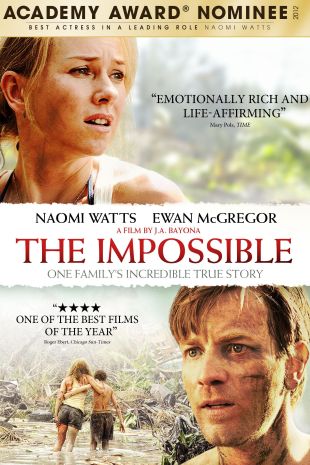Almost every time we walk into a movie theater, we run the risk of having our emotions manipulated. Whether we're watching a drama, a romance, a comedy, or a horror flick, one of the primary indicators as to whether or not that story will resonate lies in the filmmaker's ability to pull our strings through a delicately balanced blend of effective writing, skillful acting, powerful imagery, and music that reflects (or, in certain instances, contradicts) the mood of the action taking place onscreen. The best directors do this with a subtlety that renders this blatant appeal to our emotions invisible -- leaving us, the audience, alone with the characters up on the screen as they strive to accomplish a certain goal or navigate through a difficult situation. In his second feature The Impossible, Spanish director Juan Antonio Bayona takes us directly into the path of the 2004 Indian Ocean earthquake and tsunami, revealing the true story of how one vacationing family not only managed to persevere through the devastating natural disaster, but, incredibly, reunited amidst the chaos and confusion that immediately followed. It's a truly visceral piece of filmmaking, but alas, it's hindered more than helped by a certain composer's shameless attempts to get our tears swelling right along with his overwrought strings.
Henry (Ewan McGregor), his wife Maria (Naomi Watts), and their three sons Lucas (Tom Holland), Thomas (Samuel Joslin), and Simon (Oaklee Pendergast) are lounging poolside at a scenic Thailand resort following an eventful Christmas when one of the worst natural disasters in modern history changes their lives in the blink of an eye. As shock gives way to abject horror, the devoted parents fight to protect their children, along the way encountering scenes of heart-wrenching tragedy and experiencing acts of incredible compassion as the entire country is engulfed in chaos.

In 2007, Bayona burst onto the international film scene with The Orphanage. Executive produced by Guillermo del Toro, The Orphanage succeeded not simply due to its ability to frighten, but because it managed to stir our emotions by painting its specters in a tragic light. It was an effective and richly textured psychological drama served up in horror trappings. Five years later, Bayona returns with The Impossible, a film that exchanges the gothic atmosphere of The Orphanage for a sunny beach in Thailand while focusing on the all-too-real horror of a family torn apart by forces far beyond their control. On the surface The Impossible is every parent's worst nightmare brought to life, yet once the surge hits, Bayona and screenwriter Sergio G. Sánchez focus as much on the family's efforts to find each other as they do the inherent selflessness we exhibit in times of great crisis.
In The Impossible, Bayona's directorial strengths are immeasurably enhanced by a cast who do an exceptional job of emphasizing the humanity of Sánchez's compact yet emotionally complex screenplay, which alternates between the story of a critically wounded mother who strives to teach her son the healing power of altruism, and a father who refuses to give up hope even when all seems lost. In his very first onscreen film role, gifted young actor Tom Holland nearly steals the show from previous Oscar nominee Watts for a couple of reasons. Holland's remarkable ability to capture the mannerisms and nuances of his movie father serves to constantly remind us of McGregor's presence even when he's offscreen, but it's the talented young actor's ability to portray an effective mix of shock and perseverance that really drives his part of the story. When Lucas first recognizes the extent of his mother's injuries, his shaken reaction perfectly encapsulates that dreaded moment when we realize our parents aren't immortal. As a result, we understand how the tragedy has forced his character to mature in ways that he may not have been ready for. Even though she's muted by an oxygen mask for a good portion of the film, Watts shines as a mother who refuses to let her son's survival instincts overshadow his duties to the less fortunate early on. As the father who's faced with the agonizing decision to leave his two younger sons behind to search for Maria and Lucas, however, it's McGregor who personifies the unwavering sense of hope at the heart of The Impossible. A scene in which Henry uses a stranger's cell phone to place an emotionally charged call home captures that awful feeling when the horrible reality of a traumatic situation begins to set in as our consciousness struggles to catch up with our physical surroundings, and it highlights how the fleeting friendships that emerge in desperate times can have lasting and profound effects.
For all of the talent in front of and behind the camera, however, there's one component of The Impossible that threatens to push the entire endeavor over the emotional cliff, and that's Fernando Velázquez's irredeemably unctuous score. With a story this emotional, one can see why Velázquez would be tempted to flex his orchestral muscles, but we hardly need to be told how to feel while watching a movie about a family being ripped apart by a violent force of nature, and in his efforts to enhance the drama, he instead ends up undercutting it. His score for The Impossible is so over-the-top melodramatic that at times it borders on parody, and given the highly effective use of sound design throughout the film, the picture would have been much better served without it.
That pronounced shortcoming aside, The Impossible offers a refreshing air of hope in an era obsessed with fatalism, and serves as a stunning reminder that sometimes it's the worst situations that bring out the best in people.
